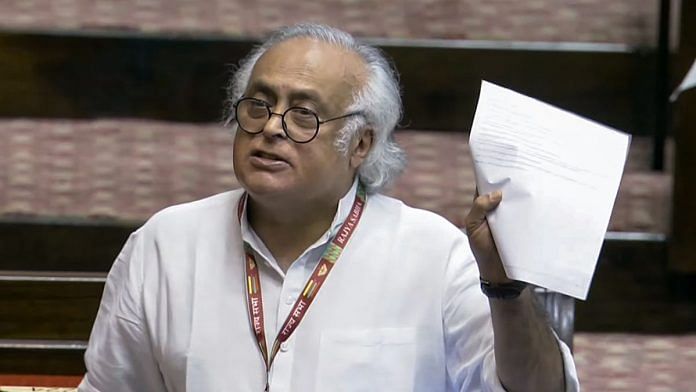New Delhi: The success of Chandrayaan-III came up on the third day of the ongoing special session in the new parliament building, with many Opposition leaders reminding the government that India’s space programme did not begin in 2014 when the BJP came into power.
Commenting on Piyush Goyal’s speech summarising the achievements of Indian Space Research Organisation (ISRO), Congress leader Jairam Ramesh said, “It appears as if India’s space journey only started in 2014, and the sutradhar of this space journey is the prime minister.”
While everyone is proud of ISRO’s achievement, India’s space programme should be “seen as an instrument for development, and not as a symbol of muscular nationalism,” Ramesh said.
He raised this during a discussion on “India’s glorious space journey marked by successful soft landing of Chandrayaan-3”
Ramesh read out the letter that Indira Gandhi wrote to Satish Dhawan in 1972, asking the latter to take charge of ISRO in light of the sudden demise of Vikram Sarabhai – who until then had been at the helm of the space agency.
Recounting the key milestones of the Indian space programme, including the setting up of the Indian National Committee for Space Research in 1962, Ramesh said, “Success of Chandrayaan 3 is based on the competencies, capabilities and capacities that have been built over a 60-year period.
Trinamool Congress (TMC) leader Jawhar Sircar also spoke in similar lines.
“The present Prime Minister must have surely contributed to this journey, but this does not mean that other PMs who laid the path did not contribute,” Sircar said.
Ramesh added that the credit of successful programmes under each ISRO Chairperson — from Dhawan to S. Somnath — was made possible because the political leadership gave them the freedom to make those contributions.
Talking about Indian National Satellite System (INSAT), Ramesh pointed out that the vision of the space programme was to make it a means of fulfilling our development aspirations.
“Indian scientists have never seen the Indian space programme as a symbol for nationalism,” he said. “While it is natural for all of us to take pride, I would like to urge all of us to look at our space programme fundamentally as an instrument of development, not as an instrument of muscular nationalism.”
Also read: Parliament will tell you 3 stories at special session. All of them are false
‘Use science, technology for development’
Sandeep Kumar Pathak, AAP leader, supported Ramesh in his speech.
After Independence, said Pathak, there were many families who did not even have enough food on their plates. “At a time like that, how could a PM think of investing public money into space — (Jawaharlal) Nehru faced a lot of political pressure against this. That is called leadership,”
“The vision of ISRO was not to chest-thump and boast about our power. The vision was to use science and technology for development,” Pathak said.
Opposition leaders also commented on the pseudoscientific statements made by leaders in the past. Sircar said that statements like ‘Ganesh’s head was reattached with plastic surgery’, or that ‘stem cell research existed during Mahabharata’ should not be made.
“Let us refrain from making irresponsible comments so that we can have many more Chandrayaans,” Sircar said.
Ramesh also added that there was no point in creating such excitement about launches like Chandrayaan-3, when it is accompanied by removing Darwin’s theory of evolution from textbooks or thinking that “all knowledge was available to India 2,000 years ago.”
“Scientific temper is the spirit of inquiry. We have had a glorious tradition in mathematics, meteorology, astronomy — let us take pride in our past, but not think that all of science was known to us. We have to move with the times, that is scientific temper,” he added.
Ramesh also pointed out that Indian industries have been manufacturing for ISRO and have been associated with India’s space programme since the 1970s.
“To say that India suddenly started making things after 2014 is a complete distortion of facts. Space programme has always been based on our partnership with the private sector. Our nuclear reactors, satellites, rockets, launchers are made in India and have been made in India since before 2014.”
Several members, including DMK’s Tiruchi Siva, Sircar, and Ramesh, commented on the fact that the strength of Indian science comes from the lesser-known public engineering colleges.
These, Ramesh said, need to be “nurtured and upgraded”.
“We have to give our scientific and technological institutions full freedom. We need to free them of any political patronage and interference,” he added.
(Edited by Zinnia Ray Chaudhuri)
Also read: Support women’s reservation bill but want OBC sub-quota, says Sonia Gandhi, demands quick rollout



